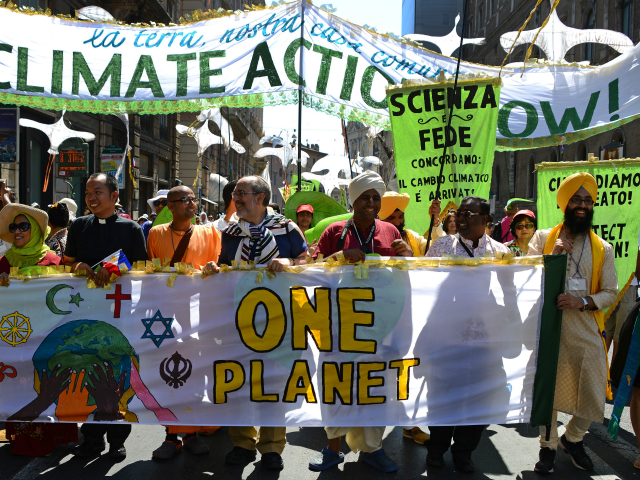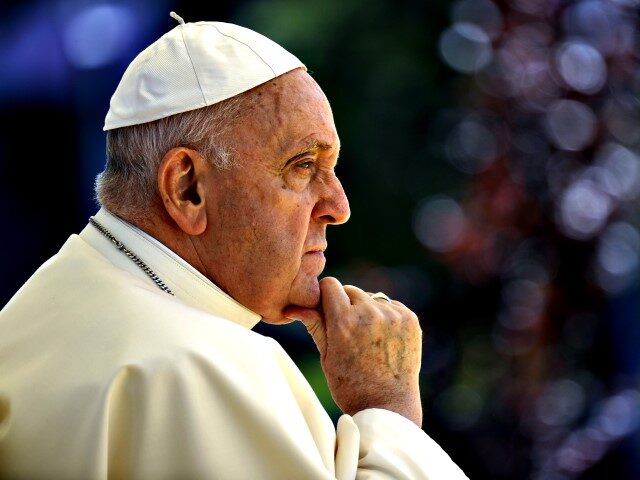ROME — The United States bishops have distanced themselves from an embarrassing letter by Pope Francis on the “climate crisis,” preferring to invest their apostolic witness in real issues of concern.
The far-left National Catholic Reporter (NCR) indulged in much ritual handwringing at the bishops’ unenthusiastic non-response to the papal letter titled Laudate Deum, a follow-up to the pontiff’s 2015 encyclical letter Laudato Sí.
In its latest issue, the NCR editorial team called the U.S. Bishops’ Conference (USCCB) official acknowledgement of the letter “underwhelming,” noting that the response “did not even warrant the attention of an actual bishop.”
“Furthermore, its brevity and vagueness read more like an ‘out of office’ kickback email than the ‘welcome’ its title claimed it to be for the pope’s new exhortation on the environment,” NCR stated.
Pope Francis once again appealed for a concerted international effort to battle climate change Monday, insisting that no one is exempt from this task. https://t.co/sEkJne8tzj
— Breitbart News (@BreitbartNews) January 10, 2022
As critics have noted, the pope’s letter wades into territory that Francis knows nothing about in an attempt to muster a pseudoscientific analysis of the “climate emergency” and to propose a concerted response to the question. Even the most ardent papist understands that the pope’s authority does not extend to meteorology.
Moreover, in that letter the pope took a gratuitous potshot at Americans, singling their “irresponsible lifestyle” as peculiarly responsible for global emissions, something that surely did not endear him to U.S. Catholics.
In a scathing review of Laudate Deum last week, philosopher Michael Pakaluk observed that Pope Francis repeatedly converted cautious statements from the Intergovernmental Panel on Climate Change (IPCC) into undeniable certainties, restating affirmations of probability as “we know.”
“Why cite an authority to support you, if it doesn’t support you?” Pakaluk asked.
“Laudate Deum consistently turns qualified statements about the world into certainties appropriate only for articles of faith,” he wrote. “Unlike a truly scientific discussion, it does not review counter-objections or conflicting evidence.”
At the same time the papal letter “speaks derisively of anyone who would disagree with its assertions,” Pakaluk adds. “Such people are attempting ‘to deny, conceal, gloss over or relativize the issue.’ Scientists, too, who disagree only ‘seek to deny the evidence.’”
Pope Francis says the Chinese coronavirus global pandemic is “certainly nature’s response” to humanity’s failure to address climate change. https://t.co/gQVMxZK4yw
— Breitbart News (@BreitbartNews) April 10, 2020
Fortunately, more sober minds seem to be gaining ascendancy in the scientific community, questioning the supposed “consensus” around the question of a climate crisis.
This summer, a group of over 1,600 prominent scientists, including two Nobel Prize winners, issued the “World Climate Declaration,” refuting the existence of a so-called “climate emergency.”
Among other things, the Declaration asserted that climate models have proven inadequate for predicting global warming, that carbon dioxide (CO2) is not a pollutant, and that climate change has not increased natural disasters.
“The geological archive reveals that Earth’s climate has varied as long as the planet has existed, with natural cold and warm phases,” the Declaration noted. “The Little Ice Age ended as recently as 1850. Therefore, it is no surprise that we now are experiencing a period of warming.”
Moreover, the world has warmed “significantly less than predicted by IPCC on the basis of modeled anthropogenic forcing,” the text stated, and the gap between the real world and the modeled world “tells us that we are far from understanding climate change.”

File/Activists display banners calling for action against world poverty, climate change and other environmental issues as they arrive on St. Peter’s square prior to Pope Francis’s Sunday Angelus prayer on June 28, 2015 at the Vatican. (GABRIEL BOUYS/AFP/Getty Images)
“There is no statistical evidence that global warming is intensifying hurricanes, floods, droughts and suchlike natural disasters, or making them more frequent,” the document declared. “However, there is ample evidence that CO2-mitigation measures are as damaging as they are costly.”
“There is no climate emergency,” it asserted. “Therefore, there is no cause for panic and alarm.”
“We strongly oppose the harmful and unrealistic net-zero CO2 policy proposed for 2050. Go for adaptation instead of mitigation; adaptation works whatever the causes are,” it concluded.

COMMENTS
Please let us know if you're having issues with commenting.